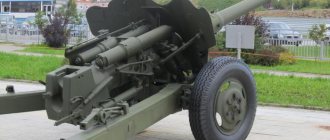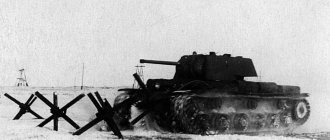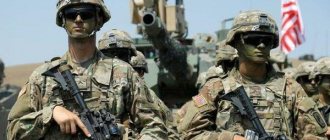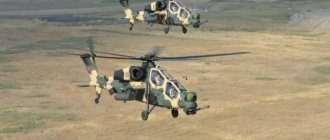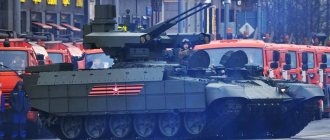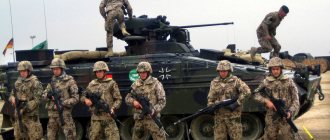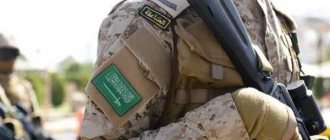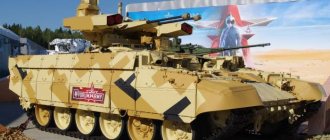Saddam's Army
Let me note right away: modern Iraq has nothing to do with the state of Saddam Hussein. After the American intervention, the country's government, self-government bodies, and military leadership went through severe personnel purges, foreign and domestic policies changed. And, of course, the tasks of the armed forces have changed.
It is also a big mistake to divide the history of Iraq into “pro-Soviet” (under Saddam) and “pro-American” - today. As the facts show, this classification is erroneous.
Indeed, the Saddam-era army, created with the active participation of Soviet military advisers, was generally modeled on the USSR army. Large armored formations, emphasis on the actions of large army formations - Baghdad got all this straight from the Soviet General Staff.
© [email protected] _Iraq
During the Iran-Iraq War (1980–1988), this strategy showed its strengths and weaknesses. The Iraqi army, due to its overwhelming superiority in all types of weapons, caused serious damage to the Iranian army. On the other hand, large concentrations of armored vehicles operating in desert areas, as well as the negligence of the Iraqi military, led to Iranian sabotage groups destroying Iraqi tanks in parking lots, getting within range of an RPG shot.
Despite its closeness to the USSR, the Iraqi army, unlike, for example, the Syrian army, was equipped with only 53% Soviet-made weapons. In 1958–1990, military equipment, artillery and ammunition worth approximately $30 billion were supplied to Iraq. Iraq bought the rest from France, Yugoslavia and a number of Eastern Bloc countries. And with the beginning of the Iran-Iraq war, Hussein’s government began to receive support from the United States.
In order to inflict damage on Iran through the hands of Hussein, the US authorities in 1982 removed Iraq from the list of countries sponsoring terrorism. Weapons and ammunition (such as aerial bombs) were supplied to Iraq through Jordan, Saudi Arabia and Turkey. According to some evidence, Pentagon intelligence prepared every strategic operation of the Iraqi Air Force, and also transmitted satellite intelligence data to the Iraqi side. At the end of the war, the United States knew almost everything about the Iraqi military machine, which they subsequently used to destroy it.
In the war with the United States and its allies, the Iraqi army suffered a crushing defeat, as well as severe losses in manpower and military equipment. As a result, old Iraq ceased to exist and in its place the United States began creating a new state structure.
© [email protected] _Iraq
At a shooting range for Iraqi troops.
Due to the increase in terrorist activity in the region, the creation of new Iraqi security forces has become a priority for the United States. They, in theory, were supposed to take on responsibilities in the fight against terrorism.
Officers and soldiers who served under Saddam were not allowed to serve in the army of the new Iraq. Hundreds of thousands of military personnel who suddenly found themselves unemployed became the main recruiting base for militants and remain so to this day.
From among the former Iraqi military and members of the Baath Party, the “High Command of Jihad and Liberation” was formed under the command of Izzat Ibrahim al-Douri, the former head of the Iraqi Interior Ministry and the son-in-law of Saddam Hussein. This organization, sometimes acting jointly with various Islamic radicals (for example, IS, banned in the Russian Federation), continues to fight the new government of Iraq. It considers the Baghdad authorities to be occupation forces and is recruiting and training new personnel.
According to Iranian and American intelligence services, former Baathist officers are responsible for sabotage and general army training in a number of Islamist groups, and the militants largely owed their military successes to them.
© [email protected] _Iraq
Column of armored vehicles of the Iraqi army.
Initially, the plan for creating Iraqi security forces provided for the creation of a National Guard consisting of three divisions, 27 battalions with a total number of 40 thousand soldiers over three years. The task is to maintain order within the country. The service recruited mainly natives of Northern Iraq - Kurds - and natives of the south - Shiite Muslims. This is explained by the fact that under Hussein these national-religious groups were oppressed. Up to and including the use of chemical weapons against peaceful Iraqi cities and the shooting of Shiite mosques from tanks.
At the same time, the central, predominantly Arab-Sunni areas became the center of resistance. A “Sunni triangle” emerged: Baghdad-Tikrit-Ramadi, where armed groups of Hussein’s supporters and Islamist terrorist groups operated.
© [email protected] _Iraq
Shelling in the “Sunni triangle”.
The US and Baghdad's bet on ethno-religious groups has not justified itself. The Iraqi National Guard refused to fight on the side of NATO forces, and its commanders often passed information on to the enemy. In connection with this, the organization was abolished. A number of units were transferred to the Iraqi army, and the Federal Police was created to maintain order in the country.
Another idea also failed - the creation of military units from among the former pro-Saddam rebels. Created according to this scheme on August 14, 2004, the brigade in the city of Fallujah often sabotaged the orders of the American military and was soon disbanded.
Despite these problems, the new Iraqi Army was eventually fully formed by June 26, 2006. It consisted of three divisions (18 brigades and 69 battalions). In 2008, the formations began military operations against various armed groups, and by 2012 they moved to a completely independent position from the United States. At the same time, the Iraqi army rarely engaged in full-scale battles, often limiting itself to targeted force operations. An ethno-religious split also emerged in the army, which ultimately led to fatal consequences.
© [email protected] _Iraq
The Iraqi army rarely engaged in full-scale battles, often limiting itself to targeted force operations.
The new Iraqi army received a large amount of military equipment from the United States, including 100–1500 M1A1 Abrams tanks, 8600 HMMWV armored vehicles (Humvees). A large amount of Soviet-made equipment was destroyed. Iraq received an unspoken ban on the creation of a national air force. In addition, the US authorities lobbied for the Iraqi army to purchase a large batch of Ukrainian-made BTR-4 armored personnel carriers in the amount of 420 pieces. The US attempt to entice the new Iraq to purchase weapons from the US and its allies was unsuccessful. During sea trials of the BTR-4, the Iraqi military discovered a lot of faults with the armored vehicle; some of the armored personnel carriers were completely sent back to the manufacturer due to significant manufacturing defects: cracks were found on the hulls.
Thus, the Iraqi army met its most difficult test in a somewhat “half-assembled” state. Huge masses of armored vehicles were collecting dust in warehouses; the military had weapons from various manufacturers in their hands, which significantly complicated the issues of supply and standardization.
All this led to the collapse of the new Iraqi army.
US ultimatum
According to press reports, the Iraqi government's failure to stop persistent attacks on US targets in Iraq prompted Secretary of State Michael Pompeo to issue an ultimatum on September 20. If measures are not taken to strengthen the security of American personnel and facilities, the US Embassy in Baghdad will be closed.
According to the US Central Command (CENTCOM), the threat from Iran to coalition forces in Iraq has not gone away: this undermines the ability of security forces to counter the Islamic State.
In a press interview in early September, CENTCOM commander Gen. Kenneth McKenzie said there had been an increase in rocket and mortar attacks "by Iranian-backed militias" in 2022. According to the US, Tehran is not yet using its more advanced weapons systems and is limited to home-made artillery.
We are talking about targeted attacks on American targets and the bombing of logistics convoys of Iraqi contractors. The blame has traditionally been placed on Iran and its associated “Islamic resistance” groups.
Federal News Agency (FAN) /
American realities absolutely do not take into account the fact that most of the pro-Iranian Hashd Shaabi militia units are war veterans who know how to conduct targeted fire and, if desired, could hit stationary objects.
Federal News Agency /
In terms of justifying accusations against Iran, it is very convenient to place the blame on Kataib Hezbollah or other Tehran-backed factions.
Tarnished reputation
After such excesses, the United States continues to talk about the advantages of its weapons, which, of course, cannot be called bad, but which are accompanied by such operating conditions that a prudent ruler will need to think many times before agreeing to a deal. After all, the same Russian machine gun installed on the Abrams now turns into a decent amount that Iraq must pay Washington for failure to fulfill the terms of the contract. Absurd, but it is absurd “in law.”
Continuing their information “attack,” American experts assure that an analysis of the threats that may face Iraq does not allow us to consider the Su-35S, Su-57, S-300 and S-400 appropriate in the weapons system of the Iraqi army. They say that if there are no such threats, then it makes no sense to acquire these weapons systems. However, I would like to note that if in 2003 Iraq had had at least a dozen divisions of the S-300 anti-aircraft missile system in service, then the coalition troops would not have had such success as they did during the actual operation. At the very least, the air part of the operation would have been disrupted - ten S-300 divisions would not have allowed the Tomahawk cruise missiles and strike aircraft to be used so successfully.
So the advisers from American experts are still looking into the distance. Lest we have to attack Iraq again after the withdrawal of our troops.
1 The organization is prohibited on the territory of the Russian Federation.
All because of oil
In relation to the situation in Syria, the report touches on the deployment of mechanized units on the M2A1 Bradley infantry fighting vehicle in the northeast of the country. This decision was made after an escalation with the Russian Armed Forces in August.
According to the American side, Russian military personnel violated established protocols for deconfliction between Russia and the United States. The report provides several examples:
- incident on August 25: a Russian vehicle collided with an American one; several people were injured;
- accusations of regular violations of the boundaries of Coalition areas south of the deconfliction zone by both ground and air forces;
- inciting the local population against the Coalition.
The Operation Inherent Resolve task force leadership cites an agreement between the American oil company Delta Crescent Energy and the Autonomous Kurdish Administration of Northeast Syria as the reason for the escalation. The stated purpose of the agreement is to help modernize oil production, exploration, development and refining.
The agreement caused sharp protest from Moscow and Damascus, which stated that there were no legal grounds for its signing. From the point of view of the American side, the Kurdish administration of Northeast Syria is legitimate and has every right to sign any agreements.
Neither Moscow nor Damascus agree with this position.
IS is unpopular in Iraq
The US Defense Intelligence Agency said Islamic State's efforts to increase its numbers in Iraq and Syria have produced mixed results.
In Iraq, the group remains unpopular: according to public opinion polls conducted among the Sunni population in May 2020, despite disappointment in the Iraqi leadership, the overwhelming majority have a positive view of the national army and a negative view of the Islamic State.
The observation is quite strange, taking into account the growth of the group’s influence, noted in the first quarter of 2022.
Federal News Agency (FAN) /
Iraqi observers also spoke about the growing influence of IS in April-May.
Federal News Agency (FAN) /
These public opinion polls look overly politicized and are intended rather to emphasize the efforts of the security forces of Iraq, which, with the support of government forces, are winning one victory after another, although in reality this is not the case.
Federal News Agency (FAN) /
IS recruitment in Syria
At the same time, in the territories controlled by the Syrian Democratic Forces and in the desert regions, the Islamic State, “defeated” in Iraq, continues to live.
Federal News Agency /
The militants are recruiting young people dissatisfied with the government and seeking to exploit the economic difficulties that have arisen during the COVID-19 pandemic. The group pays great attention to the Al-Hol refugee camp, where relatives of militants are being held.
A report by the UN Secretary-General released in August found that curfews and travel restrictions imposed in response to COVID-19 had made it difficult for terrorists to move and find potential targets. The UN Secretary General said that the pandemic will serve as an additional incentive for prisoners to escape.
The report says Islamic State militants have exploited the pandemic for propaganda purposes, calling it "divine punishment" for enemies and mobilizing supporters to carry out attacks at a time when Coalition resources are stretched to the limit.
Despite regular reports on the successful operations of the International Coalition, the US Defense Inspector General claims that the Islamic State could regain influence at any time. And the fact that the organization’s militants continue to recruit recruits only confirms his words.
However, for some reason this is at odds with the words about the popularity of IS in Iraq.

